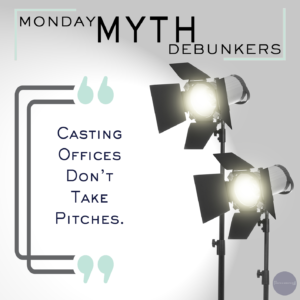 This one might be more for the agents/managers in the house but it’s also helpful for actors to hear too.
This one might be more for the agents/managers in the house but it’s also helpful for actors to hear too.
Oh, pitches. It’s what causes our phones to fall off the hook and is the primary reason we are ever weeks behind on emails.
Are they effective? Are they annoying? Do they matter?
First, let’s make sure we’re all on the same page as far as what pitches actually are.
In this instance, we’re specifically referring to agent/managers who pitch their clients for specific roles that we are currently casting.
Pitches can be in the form of emails or phone calls. And very typically, we get the same pitch in both forms.
Now for the burning question…𝘩𝘰𝘸 𝘥𝘰 𝘸𝘦 𝘧𝘦𝘦𝘭 𝘢𝘣𝘰𝘶𝘵 𝘵𝘩𝘦𝘮?
Well, we first need to preface this question with the reminder that this answer is subjective and casting directors will have different feelings about pitches.
But for the most part, finding great actors for the roles we are casting is our job.
And how we do that doesn’t really matter: whether it’s by watching reels, seeing someone in a play, or by taking a pitch.
The TLDR version:
Good pitches = effective
Bad pitches = not so effective
Seems simple right?
Well then, what constitutes a “good pitch?”
A good pitch is one that is thought-through; where an agent isn’t just throwing spaghetti to the wall in hopes that it sticks.
Meaning: The actor is RIGHT for the role, they’ve included links to their materials (vs. making us look them up), and have kept the pitch short, sweet & to the point.
If they’re right for the role, why WOULDN’T we bring them in? (Pending our schedule isn’t already full).
Not so great pitching =
👉 Pitching an entire roster and playing “the numbers game.”
👉 Incessantly following up on pitches. Again, if they are right for the role, they are getting an audition. Simple.
👉 Pitching clients in separate email (rookie mistake but reps… please, please don’t do this).
👉 Pitching clients with just their names in the email. Not specifying what role they are for and/or not including links to their materials.
Pitching yourself (meaning you are emailing the CD, not your rep) can be a difficult decision to make.
If you decide to pitch yourself for a role, it’s important to consider the following:
1. Be 𝘪𝘯𝘵𝘦𝘯𝘵𝘪𝘰𝘯𝘢𝘭 with your time and ours. Don’t pitch yourself for every role and every episode—it’s not possible for you to be perfect for every role. Save the email for roles you actually have a shot at.
2. Make your pitch short & sweet. Feel free to jog our memory of how you met us and then get straight to it. Make sure you are specific with which role you are submitting for and include links to your reel. Having a headshot in your signature is SUPER helpful.
3. Don’t expect an email back. 𝗪𝗲 𝗮𝗿𝗲 𝗯𝘂𝘀𝘆. If we want to bring you in, we will absolutely send you audition information. Cross our hearts.
4. Please don’t follow up. Again, we are busy. But we also want to do a great job. So if we think you have a high chance of getting the role, there’s absolutely no reason we wouldn’t bring you in.
5. Please don’t have your agent follow up—again, if we want to bring you in…
6. Express gratitude. A little gratitude goes a long way in this industry and you can almost never go too overboard with gratitude.
7. Remind yourself that there are pieces of information that are often left out of the breakdown. The reason you didn’t get an audition often times are due to reasons that are not outwardly obvious.
At the end of the day, pitching will not get you the job, 𝕠𝕟𝕝𝕪 𝕪𝕠𝕦 𝕨𝕚𝕝𝕝 𝕘𝕖𝕥 𝕪𝕠𝕦𝕣𝕤𝕖𝕝𝕗 𝕒 𝕛𝕠𝕓.
But it 𝘤𝘢𝘯 be helpful in getting you in the door.
#themoreyouknow #thecastingdirectorscut #mondaymythdebunkers #actorlife
That was a really wonderful read, very helpful! Going to add a headshot to my signature right now. Thanks a lot.